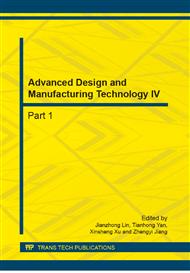[1]
A.A. Gannochka: ERP-one of the latest tools for creating CAM; Mountain awareness- analytical bulletin [Scientific and technical journal], (2005), vol. 5, 149 p.
Google Scholar
[2]
S.A. Bychkov: The nature and impact of the ERP–system on the efficiency of the enterprise; Actual problems of the humanities and natural sciences, (2012), vol. 9, p.67, 69.
Google Scholar
[3]
O.V. Lazareva, I.A. Denisov, S.V. Tsukhlo: Hiring or Retraining: experience of Russian companies, Moscow: IET, (2006), 15 p.
Google Scholar
[4]
V. Boychev: Automated System investor's control, St. Petersburg: MIPKI, (2013), p.5, 6, 40.
Google Scholar
[5]
O.A. Savina, U.O. Kalinina: The main problems of the implementation of ERP – systems at plants in Russia; Information Systems and Technology, (2008), vol. 1-3, pp.238-241.
Google Scholar
[6]
S.A. Shchetinin: Organizational and economic support for the effectiveness of management information systems at the enterprise. Dissertation for the degree of candidate of economic sciences: Specialty 08. 00. 05. Belgorod, (2005), pp.36-42.
Google Scholar
[7]
E.A. Khvalev: Key characteristics in ERP implementation projects: conceptual model for analysis; Proceedings of the 4th Conference on Theory and Practice of Modern Science, Moscow, Russia, 30-31 August, (2010).
Google Scholar
[8]
A. Uta, I. Întorsureanu, R. Mihalca: Criteria for the selection of ERP software; Informatica Economică, (2007), vol. 2, 63 p.
Google Scholar
[9]
E.A. Teslinova: Development of a technique of forming a knowledge management system in an automated information organization's environment: the case of ERP – system. Dissertation for the degree of candidate of economic sciences: Specialty 08. 00. 13, Moscow, (2007).
Google Scholar
[10]
S.S. Ignatyev: Development of conceptual concepts and methods of implementation of ERP – systems for the company with a single type of production. Dissertation for the degree of candidate of economic sciences: Specialty 08. 00. 13, St. Petersburg, (2008).
Google Scholar
[11]
M.N. Rakovich: The introduction of integrated management systems as a factor in increasing the efficiency of Russian industrial enterprises. Dissertation for the degree of candidate of economic sciences: Specialty 08. 00. 05, Yekaterinburg, (2004).
Google Scholar
[12]
O.A. Khvoichkina: Technology standard implementation of corporate management systems. Dissertation for the degree of candidate of economic sciences: Specialty 08. 00. 13, Moscow, (2008), 4 p.
Google Scholar
[13]
I.V. Bagautdinova: Innovative management of enterprises on the basis of information systems. Dissertation for the degree of candidate of economic sciences: Specialty 08. 00. 05. St. Petersburg, (2009), 6 p.
Google Scholar
[14]
Large, giant construction USSR of Abkhazia [Electronic resource]. URL: http: /www. liveinternet. ru/community/1512121/post34994734/ (date of application 14. 05. 2014).
Google Scholar
[15]
E.V. Chegotova: Role of technical customer in the organization investment and construction activities; Magazine of Civil Engineering, (2012), vol. 3(29), 7 p.
Google Scholar
[16]
A.V. Rechinskiy, K.I. Strelets: Professional development for design and construction of especially dangerous, technically difficult and unique objects; Internet Journal Construction of Unique Buildings and Structures, (2012), vol. 1, 37 p.
Google Scholar
[17]
ASIC [Electronic resource]. URL: http: /aciksoft. eu/Default. aspx (date of application 14. 05. 2014).
Google Scholar
[18]
J. Tamošaitienė, E.K. Zavadskas, Z. Turskis: Multi-criteria Risk Assessment of a Construction Project; Procedia Computer Science, (2013), vol. 17, 129 p.
DOI: 10.1016/j.procs.2013.05.018
Google Scholar
[19]
E.K. Zavadskas, Z. Turskis, J. Tamosaitiene: Selection of construction enterprises management strategy based on the SWOT and multi-criteria analysis; Archives of civil and mechanical engineering, (2011), vol. 4, pp.1063-1082.
DOI: 10.1016/s1644-9665(12)60096-x
Google Scholar
[20]
Article 748. The control and supervision of the customer for the performance of work under a construction contract [electronic resource]. URL: http: /lawbook. actoscope. com/gk/chast-vtoraya/razdel-iv/glava-37/paragraf-3/statya-748-kontrol-i-nadzor-zakazchika-za-vypolneniem-rabot-po-dogovoru. html (date of application 14. 05. 2014).
Google Scholar


